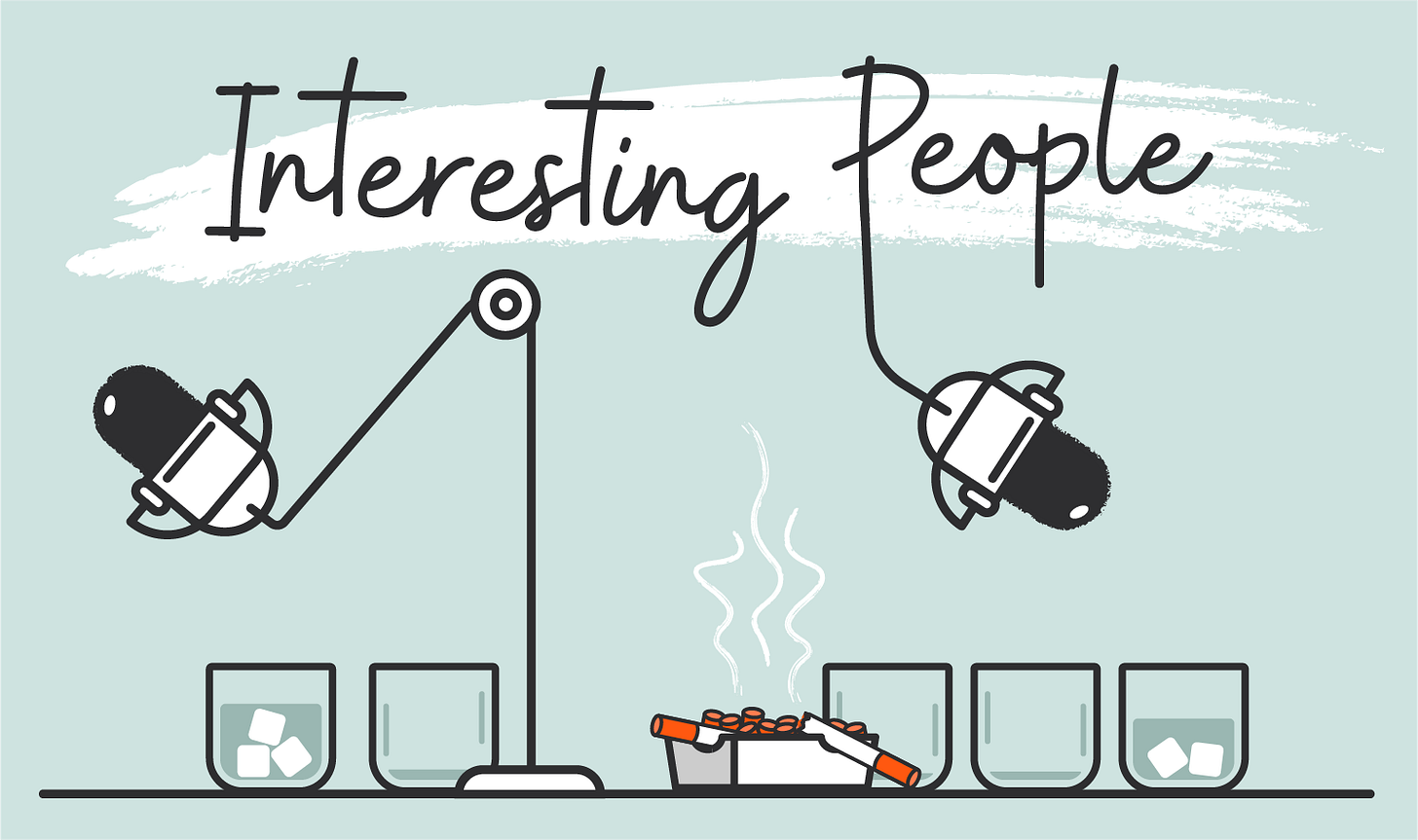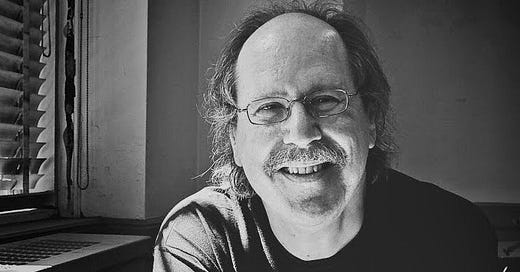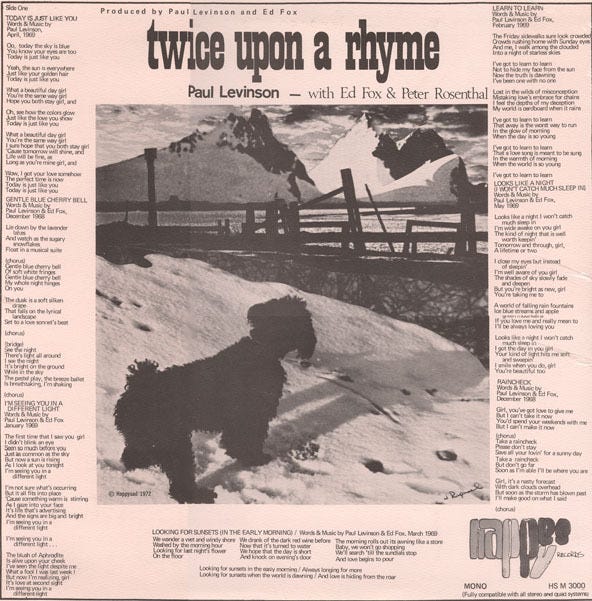
When I decided to start writing for an audience again I knew I needed to create new features that would be unique to Substack. I gave a lot of thought to recording a podcast, but nixed the idea because both the time and monetary investments would be enormous. The premise of it was pretty simple: each episode I would ask someone ten questions.
Throughout my forty years on this planet, I think I've met a lot of people from all walks of life who I find to be talented, unique, or fascinating in ways that I admire. Whether it's what they do for a living, something they've accomplished, a distinctive hobby... my life is enriched by friends and acquaintances who delight me in a variety of ways. I want to share the joy of knowing so many interesting people with my subscribers.
In lieu of a podcast I’m going to attempt to achieve the same result here. I’ll try to post one of these per month, and promise to use the paywall only sparingly.
The goal of this endeavor is to remind us all to appreciate the connections and friendships we have, and value the people in our lives for who they are.
This month’s interesting person is Paul Levinson! I first met Paul way back in 2009 when I was writing for WFMU’s Beware of The Blog. A few years earlier I had been introduced to Paul’s 1972 private-press album Twice Upon A Rhyme by a fellow record collector. I became enamored of it, and decided to contact Paul in the hopes of learning more about the record. He’s a professor at Fordham University, so he wasn’t that hard to track down. On a visit back east I met Paul at a diner in the city, and you can read the transcription of that chat here.
In the years since we have remained in touch mostly via Twitter (don’t call it by its new name, boastfully dead-name that cesspool at every opportunity and do so proudly) and sometimes by email when discussing things like a new album or recently published book.
Paul reached out back in July to offer a PDF of his new short novel, It’s Real Life: An Alternate History Of The Beatles and of course I obliged! It’s a brilliantly written and fun sci-fi tale that is perfect for fans of the genre and music nerds. Upon finishing the story, I asked if I could ask him ten questions for this here newsletter, and here we are.
Paul is a gem of a human and I’m honored to know him and call him a friend. His keen mind for media and pop-culture make more than deserving of a follow on Bluesky or Threads (which I don’t use) or whatever your non-Twitter social media of choice is. If I could audit his courses at Fordham I would! You should, if that’s even a thing people do anymore…
These are his answers to my ten questions. Please enjoy.
Please help me make sense of the recent election from a media perspective. What the hell happened?!
There are lots of likely reasons for Trump’s success in the 2024 election, which I view as the biggest domestic threat to our democracy and way of life since the Civil War. As a media theorist, I’m of course aware of the destructive impact of disinformation aka deliberate deception (in contrast to misinformation, which could be honest mistakes) that has engulfed X and other social media. As a human being, I’m of course aware this is the second time a vastly superior woman has lost a Presidential election to Trump. But what I don’t hear talked about enough, or at all, is the how the hounding of Joe Biden out of the race – by Democrats, everyone from the New York Times, to George Clooney, to Adam Schiff – set up this fascist result. I said shortly after Biden’s atrocious performance in his June 2024 debate with Trump that maybe we shouldn’t put so much stock in debates, because, after all, what does performance in a debate have to do with a President’s decisions when Russia attacks Ukraine, and other life-and-death matters of governing? I’ve just updated my McLuhan in Age of Social Media (continuously updated since its publication in 2015) to discuss this in more detail. But the gist is: maybe the Democrats should have rallied around Biden rather than driving him out of the race. Maybe the man who was born in Pennsylvania might have won that state, and the other Midwest swing states. But, of course, that’s alternate history, so we’ll never know.
2024 is almost over, so I have to ask the best new album — or recent discovery — you’ve heard this year?
That would be “Anna” written and initially recorded by Arthur Alexander. I probably heard it back in the 1960s, when I first was swept in and up and away by The Beatles. But something got me to listen to John Lennon singing that song again, on YouTube, this past year. The Lennon and the Alexander versions are both outstanding – I like Lennon’s a little better – but there also are some great covers out there on YouTube. My favorite is Grace Haylor’s, and the Rec Project’s is a close second. Not only is Anna one great song, but I enjoy the fact that although the full title of the song is “Anna (Go To Him),” everyone including Arthur Alexander who wrote the song sings “Anna (Go With Him)”. Go figure.
I know that I could very easily sell my readers on your new short novel It’s Real Life… but what is your elevator pitch?
Well, if you feel, as I do, that the worst assassination in history was not JFK’s or Martin Luther King, Jr’s, as terrible as they were, but John Lennon’s – because he was a magical singer and songwriter and guitar player and band creator, and his killing was the killing of music, all the memorable music Lennon would have made, by himself, or with The Beatles if they had reunited, or who knows who else, and now we’ll never have that – well, then, wouldn’t you want to explore how an alternate reality in which John Lennon was still alive, and The Beatles still together, in 1996 might have played out? The universe got twisted out of shape in a uniquely profound way on that day in 1980, and It’s Real Life was the way I chose to set it right. I got a lot of pleasure writing a scene in which the hero of the story, disc jockey Pete Fornatale, has a conversation in the Village over sushi with John Lennon and David Bowie, who happen to walk in the restaurant when Pete is having lunch with some colleagues in 1996 – and I hope you the reader will find some pleasure in that, too. By the way, Anthony Marinelli, a playwright who’s a real live person and is a character in the novel, put up a list of all the songs on Spotify that play a role in the novel. As to what works Simon might classify as similar to It’s Real Life, I know he thinks Rob Sheffield’s Dreaming of the Beatles -- a nonfiction book – is a masterpiece (I do, too – here’s my lengthy series of reviews), so Simon would probably mention that book, and The Singer Sisters, a novel by Sarah Seltzer about a folk-rock singing family that just came out this year (here’s my review). Also The Man in the High Castle. By the way, Simon put up a great little review of It’s Real Life on Goodreads.
How has your approach to songwriting changed — if at all — from the first song you wrote until your most recent composition?
“The Park at Night” is the very first song I wrote – I just 16 when I wrote it. But I only wrote the lyrics (my friend Paul Gorman wrote the music). My most recent song is “Pictures on the Phone,” for which I wrote the words and the music. And my most recent lyric, which I don’t have any music for as yet, is “I Fell in Love with a Robot,” which was just published as a poem. No disrespect to “The Park at Night,” but just about any song I wrote after that was vastly better. Check out Spun Dreams, an album of mostly demos I began writing 2-3 years after “The Park at Night”.
Pretend I’m your publisher telling you it is time to release a revised edition of New New Media (perhaps with the brilliant title, New New New Media). What would you choose to focus your update on?
There probably won’t be a New New New Media, but people thought I was stuttering as a writer as it is with the New New Media. I did publish a short book in 2015, McLuhan in an Age of Social Media, which I continuously update, and I mentioned in my answer to your first question. New New Media is essentially an optimistic book about social media, and the power it gives everyone to create as well as receive art and news and everything in between. Unfortunately, since 2012, when the second edition of New New Media was published, we’ve seen also how caustic and damaging that power can be. I take some of that up in my discussion of fake news in McLuhan in an Age of Social Media.
I am someone who often struggles with completing long-form writing projects. How do you do it?
I once had a professor at New York University – Guy Moglia – who maintained that just about any and all ideas could be expressed in a variety of forms and lengths. It’s Real Life started as a short story. It was made – by one of my former students at the New School for Social Research in NYC, Vin Tese, when I teaching there in early 1980s – into a radio play. (The short story and the radio play won The Mary Shelley Award for outstanding fiction in 2023.) And then I developed the short story in the novel. I’ve never written a novel in which I knew at the beginning how it would end. I just figure that out, how to get there, chapter by chapter, sometimes line by line. I just make it up as I go along. I never write an outline, or write from it – following an outline would take all of the fun away from my process of writing. I like to be surprised with where my story is going. It’s not that it’s writing itself. I know I’m writing it. But it feels like I’m telling myself a story and I never quite know where it’s headed until I’m in the process of writing it.
You have a lengthy and rich songwriting history so you seem like a great person to ask: Has a perfect pop song ever been written?
Well, more than half the songs by the Beatles are perfect, though we’d probably disagree on which songs were in what half. Some of the songs by [Bob] Dylan, the Beach Boys, the [Rolling] Stones, and the Lovin’ Spoonful are perfect. And then there’s Motown – just about anything written by Smokey Robinson or sung by the Supremes is perfect. As to why, there are several factors. The lyrics and the music need to work flawlessly together, be a perfect fit. The lyrics need to do at least two things: say something memorable or important, about the world or life or capturing a feeling, and they need to have clever rhymes. The music needs to stick in your head, bounce around in your brain, and not let you go. By the way, back to who has written or performed the perfect song, there are some number of artists who have just one perfect song – the Vogues singing “You’re the One,” Crispian St. Peters singing “Pied Piper,” etc. And come to think of it, Gordon Lightfoot had at least a few.
Your blog has an incredible archive of TV reviews. In your opinion, what is the best television show in the history of the medium?
I distinguish between dramas and comedies, and other television genres. Most of the best sitcoms, for me, come from the 1960s – “All in the Family,” and “Mary Tyler Moore,” – and, more recently “Veep,” and “Curb Your Enthusiasm,” which may be the best sitcom ever on television, and is among the best television shows cutting across all genres (for some reason, though, I never watched that much of “Seinfeld”). The reason that “Curb” is so powerful is that what Larry David says and does about life is what most of us may think but never say or do. For drama, “The Wire” and “The Sopranos” are tied for first, and that’s again, because both show criminals as having a lot of the same family and business characteristics as the rest of us in everyday life. “The Twilight Zone” is of course in a class by itself, with at least half a dozen brilliant and unforgettable self-contained episodes. And while we’re into science fiction, Star Trek the original series and the Next Generation are both masterpieces, and The Man in the High Castle (again), adapted into a TV series on Amazon Prime Video, is the best streaming television, because alternate history has a special place in my intellect and soul. (Here’s an extended interview I did with Rufus Sewell, whose character in the TV series didn’t even exist in the Philip K. Dick novel. In other words, the TV adaptation was an alternate history of the alternate history novel.) I’ll also say that there are a lot of new masterpieces coming out on television – I think “Day of the Jackal,” a new TV series on Peacock adapted from John Forsythe’s novel, is even better than the aptly lauded movie.
Your new book explores a world (or worlds!) in which John Lennon was never assassinated. Have you given any thought to adapting the premise to other musically or historically significant moments?
Sure, there could be alternate histories about every rock star who died young meeting a kinder fate and surviving, but I’m not likely to write any of them. I still have lots of ideas in my head for science fiction novels, including expanding a few short stories into novels, and want to get those out into the world. But you never know – or at least, I never know – what will be spark a new novel in my head. For It’s Real Life, what got me to develop the “It’s Real Life” short story (and then radio play) into a novel was Pete Jackson’s wonderful The Beatles: Get Back nearly eight-hour movie (and here’s my review of that). The Beatles Channel on Sirius XM Radio got me thinking about the short story, and Jackson’s documentary ignited the novel. (By the way, a younger Peter Jackson is discussed in the novel.) Isaac Asimov’s The End of Eternity, a short novel which I first read when I was 13 years old, is still my favorite science narrative, aka the best time travel story ever written. Other contenders are Robert A. Heinlein’s “The Door Into Summer” novel, as well as his short stories “By His Bootstraps” and “All You Zombies”. And Harlan Ellison’s “The City on the Edge of Forever” (a Star Trek episode) is right up there with the best time travel stories ever written, too.
You’ve peered into alternate dimensions, now is the time to take a look into your crystal ball: Will there ever be another Beatles?
Well, no and yes. Hegel thought there was a “spirit of an age,” in which all forms of art and creativity revolved around or reflected a common theme. As an example, a few years after Hegel died, Impressionism found expression in painting, music, and poetry. The Beatles were the spearhead of culture in the 1960s, mostly encompassing the psychedelic age, but other things, too. They were influenced and drew upon Bob Dylan and the Beach Boys, but for the most part they were the influencers in setting the trends and the pace. So, no, there will never be another band that goes through the same permutations as the Beatles did, any more than there will be another Monet painting in watercolor or another Debussy making that kind of Impressionistic music. But, yes, there will be other musical artists who will have as much impact as The Beatles. Some people think and say Taylor Swift is a current example of that. I don’t hear it, but it may be that each human being can only relate to one spirit of an age, which splashed and engulfs them at just their right age.






